Spelling Study Guide
Spelling is the act of forming words from letters in the correct order. It is an essential skill in language arts as it contributes to effective written communication.
Key Concepts
- Phonetic Awareness: Understanding the relationship between sounds and letters is crucial for spelling. Encourage students to practice phonemic awareness activities to improve their spelling skills.
- Word Patterns: Recognizing common patterns and rules in words can help students become better spellers. Teach students about common prefixes, suffixes, and root words to improve their spelling abilities.
- Memorization: While understanding word patterns is important, some words simply need to be memorized. Encourage students to use mnemonic devices and repetition to remember the spelling of challenging words.
- Proofreading: After writing, students should proofread their work to identify and correct any spelling errors. Encourage them to use tools such as spell checkers and dictionaries to verify the spelling of unfamiliar words.
Study Tips
Here are some tips to help improve spelling skills:
- Practice Regularly: Encourage students to practice spelling words regularly to reinforce their learning.
- Use Mnemonics: Mnemonic devices can aid in remembering the spelling of challenging words. Encourage students to create their own mnemonic devices for difficult words.
- Word Games: Engage students in fun word games such as crossword puzzles, word searches, and Scrabble to make learning spelling enjoyable.
- Read Aloud: Reading aloud can help students become familiar with the spelling of words and improve their phonetic awareness.
Common Spelling Rules
Here are some common spelling rules to remember:
- Silent E: When a word ends with a silent "e," it often makes the preceding vowel long (e.g., "bike," "game").
- Double Consonants: In words with a short vowel sound, double the final consonant before adding a suffix (e.g., "planning," "stopped").
- Drop the E: When adding a suffix that begins with a vowel to a word ending in a silent "e," drop the "e" (e.g., "hope" becomes "hoping").
- Plural Nouns: Most plural nouns are formed by adding "s," but words ending in "s," "x," "z," "ch," or "sh" require "es" (e.g., "boxes," "buzzes").
Conclusion
Spelling is a fundamental skill that contributes to effective written communication. By understanding phonetic awareness, word patterns, and common spelling rules, students can improve their spelling abilities. Encourage regular practice, the use of mnemonic devices, and engagement in word games to make learning spelling enjoyable and effective.
[Spelling] Related Worksheets and Study Guides:
.◂English Language Arts Worksheets and Study Guides Eighth Grade. Spelling
Study Guide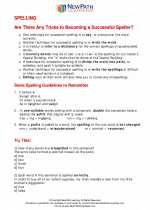 Spelling
Spelling  Activity Lesson
Activity Lesson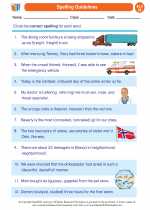 Spelling Guidelines
Spelling Guidelines  Activity Lesson
Activity Lesson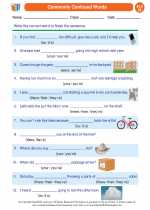 Commonly Confused Words
Commonly Confused Words  Worksheet/Answer key
Worksheet/Answer key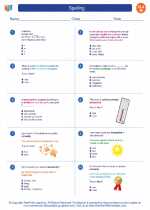 Spelling
Spelling  Worksheet/Answer key
Worksheet/Answer key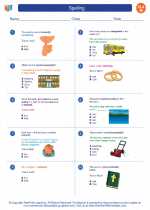 Spelling
Spelling  Worksheet/Answer key
Worksheet/Answer key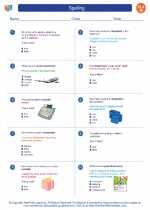 Spelling
Spelling  Worksheet/Answer key
Worksheet/Answer key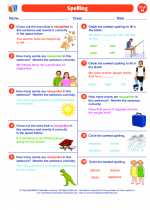 Spelling
Spelling 

 Activity Lesson
Activity Lesson
 Activity Lesson
Activity Lesson
 Worksheet/Answer key
Worksheet/Answer key
 Worksheet/Answer key
Worksheet/Answer key
 Worksheet/Answer key
Worksheet/Answer key
 Worksheet/Answer key
Worksheet/Answer key

The resources above cover the following skills:
Students apply knowledge of language structure, language conventions (e.g., spelling and punctuation), media techniques, figurative language, and genre to create, critique, and discuss print and nonprint texts. (NCTE)